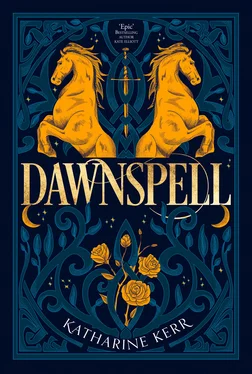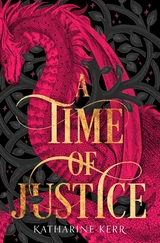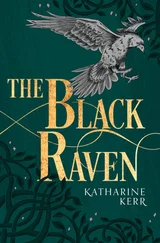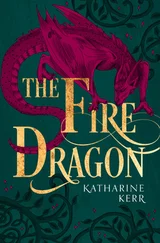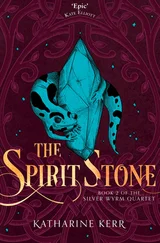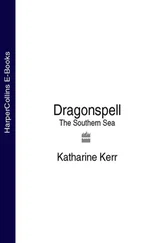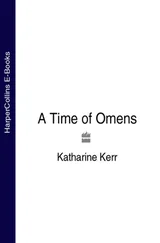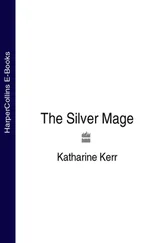‘None, but Maelwaedd blood tends to be strong, and Olwen, poor lass, was one of those blonde and bland sorts. Rhodry’s bastard might have a very important role to play in what lies ahead, so I keep her with me at all times – to supervise her upbringing, of course.’ For all her talk of political purposes, she kissed the top of the child’s head with a genuine fondness, then motioned to the nursemaid. ‘Now let Mistress Tevylla take you away and give you some bread and milk. It’s almost time for bed.’
Although Rhodda whined, begged, and finally howled, Lovyan held firm and scooped her up bodily to give her to her nurse, who was hovering by the chamber door. Nevyn hadn’t truly noticed her before, but he saw now that she was a striking woman of about thirty, with dark hair, dark eyes and almost severely regular features. Once she and her small charge were gone, Nevyn asked about her.
‘Tevva?’ Lovyan said. ‘A charming woman, and with a will of steel, which she needs around Rhodda, I assure you. She’s a widow, actually, with a son of her own, who’s – oh ye gods, I don’t remember his age, but old enough for Cullyn to be training him for the warband. Her man was a blacksmith down in my town, but he died suddenly of a fever two winters ago. Since she had no kin, the priests recommended her to my charity, and I needed a woman for Rhodda. That child is a worse handful than even her father was.’ She sighed, and since they were alone, she could be honest. ‘I suppose it’s the elven blood in their veins.’
‘I’d say so, for all that Rhodda doesn’t have much of it.’
‘A full quarter, let us not forget. Don’t fall for your own lies about a trace of elven blood in the Maelwaedds.’
‘Well, it’s not a lie, because there is one, but of course, it doesn’t apply here. I take it you plan to make the child a good marriage some day?’
‘An influential marriage, certainly, and I plan to teach her now to make any marriage suit her own purposes. If she can learn to channel all that wilfulness, she’ll be a woman to reckon with in Eldidd, illegitimate or not.’
Although Nevyn agreed with vague words rather than burden her further, he privately wondered if the child could ever be tamed and forced into the narrow mould of a noble-born woman. Sooner or later, her wild blood was going to show.
Before he left Dun Bruddlyn, Nevyn made a point of scrying out Rhodry and, when he found him well, telling Lovyan so. As he rode out, leading his pack-mule behind him, he felt a dread that was as much logic as it was dweomer-warning. The summer before, he and those others who studied the dweomer of Light had won a series of victories over those who followed the dweomer of darkness. They had not only disrupted an elaborate plot of the dark masters but had also ruined one of their main sources of income, the importing of opium and various poisons into the kingdom. The dark ones would want revenge; they always did, and he reminded himself to stay on guard in his travels. Of course, it was likely that they’d scheme for years, trying to lay a plan so clever and convoluted that it would be undetectable. It was likely, but at the same time, the dweomer-warnings came to him in a coldness down his back. Since the dark masters were so threatened, they would doubtless strike back as soon as they could. The only question was how.
And yet other, more mundane matters demanded his attention as well. The gwerbretrhyn was too rich, too desirable, to stay peaceful if the line of succession should be broken. As much as he hated involving himself in the schemings and feudings of noble clans, Nevyn knew that his duty to Rhodry’s dweomer-touched Wyrd also imposed on him a duty to Rhodry’s rhan and to his innocent subjects, who preferred peace to war, unlike noble-born men like Talidd. He would fight with every weapon he had to keep Aberwyn safe. For all that Lovyan was sceptical about his political skills (and he knew full well that she was), he was better armed for this fight than any man in the kingdom, right down to the wisest of the High King’s councillors. Oh, I learned a trick or two that time, he thought to himself, and our Rhodry was right in the middle of that little mess, for all that he was a humble rider then, and an outlawed man! Although it had been well over a hundred years ago, he knew what it was to battle for the throne of not merely a gwerbret, but a king.
Part One Deverry and Pyrdon, 833–845
When Dilly Blind went to the river,
To see what he could see,
He found the King of Cerrmor
A-washing his own laundry …
Old Eldidd folk song
The year 833. Slwmar II, King in Dun Deverry, received a bad wound in battle. The second son of Glyn II, King in Cerrmor, died stillborn. We took these as bad omens. Only later would we realize that Bel in His Wisdom was preparing peace for His people …
The Holy Chronicles of Lughcarn
The flies were the worst thing. It was bad enough to be dying, but to have the flies so thick was an unjust indignity. They clustered, buzzing, round the wound and tried to drink the blood. It hurt too much to try to brush them away. The wound was on his right side, just below the armpit, and deep. If someone could have stitched it for him, Maddyn supposed, he might have lived, but since he was all alone in the wild hills, he was going to die. He saw no reason to lie to himself about it: he was bleeding to death. He clutched the saddle-peak with his left hand and kept his right arm raised, because the wound blazed like fire if he let his arm touch it. The blood kept oozing through his shattered mail, and the big shiny blue-black flies kept coming. Every now and then, a fly bit his horse, which was too exhausted to do more than stamp in protest.
Maddyn was the last rider in his warband left alive. Since, when he died, the enemy victory would be complete, it seemed honourable to try to postpone their victory for a while; it seemed important then, as he rode slowly through the golden autumn haze, to cheat them of their victory for twenty minutes more. Ahead, about a mile away, was a lake, the surface rippled gold and shining in the sunset. Along the edge stood white birches, rippling in the rising wind. He wanted water. Next to the flies, being thirsty was the worst thing, his mouth so dry that he could barely breathe. His horse ambled steadily for the lake. It wouldn’t matter, his dying, if only he could drink first.
The lake was coming closer. He could see the rushes, dark strokes against bright water, and a white heron, standing one-legged at the edge. Then something went wrong with the sun. It wasn’t setting straight down, but swinging from side to side, like a lantern held in someone’s hand as they walked. The sky was dark as night, but the sun kept swinging back and forth, a lantern in the night, back and forth, wider swings now, up up high up all the way to noon above him and blazing. Then there was darkness, the smell of crushed grass, the flies buzzing and the thirst. Then only darkness.
A lantern was burning in the darkness. At first, Maddyn thought it was the sun, but this light was too small, too steady. An old man’s face leaned over him. He had a thick mane of white hair and cold blue eyes.
‘Ricyn.’ His voice was low but urgent. ‘Ricco, look at me.’
Although Maddyn had never heard that particular name before, he knew somehow that it was his, and he tried to answer to it. His lips were too dry to move. The old man held a golden cup of water to his lips and helped him drink. The water was sweet and cold. I won’t die thirsty after all, Maddyn thought. Then the darkness came again.
The next time that he woke, he realized that he wasn’t going to die. For a long time, he lay perfectly still and wondered at it: he wasn’t going to die. Slowly he looked around him, for the first time wondering where he was, and realized that he was lying naked between soft wool blankets on a pile of straw. Firelight danced over the walls of an enormous stone room. Although his wound still hurt, it was nicely bound with linen bandages. When he turned his head, he saw the old man sitting at a rough wooden table by the stone hearth and reading in a leatherbound book. The old man glanced up and smiled at him.
Читать дальше
